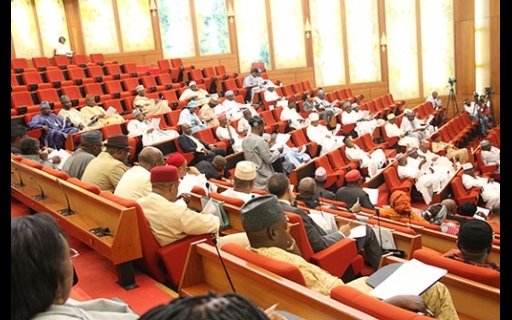The Senate has passed President Muhammadu Buhari’s Finance Bill 2020 transmitted to the National Assembly two weeks ago for consideration and passage.
A statement by the Senate President’s Special Assistant (Press), Ezrel Tabiowo, sais the passage of the bill was sequel to the consideration of a report by the Senate Joint Committee on Finance; Customs, Excise & Tariff; Trade and Investment; and Public Procurement.
Chairman of the Joint Committee, Senator Olamilekan Solomon Adeola (APC – Lagos West), in his presentation said the Finance Bill 2020 specifically seeks to amend 17 key areas.
They are: Capital Gains Act; Companies Income Tax Act; Industrial Development (Income Tax Relief) Act; Personal Income Tax Act; Tertiary Trust Fund Act; Customs and Excise Duties Tariff; Value Added Tax Act; Stamp Duties Act; and Electronic Transaction Levy.
Other areas amended are: Federal Inland Revenue Service (Establishment) Act; Nigeria Export Processing Zone Authority Act; Oil and Gas Export Processing Zone Act; Crisis Intervention Fund; Unclaimed Funds Trust Fund; Companies and Allied Matters Act, 2020; Fiscal Responsibility Act; and Public Procurement Act.
President Muhammadu Buhari, in a letter dated 25th November, 2020, which accompanied the Finance Bill during transmission, said its passage would support the implementation of the 2021 budget through key reforms to specific taxation, customs, excise, fiscal and other laws.
According to him, the proposed amendment to the bill seeks to: “adopt appropriate counter-cyclical fiscal policies to respond to the economic and revenue challenges precipitated by the decline in international oil prices, as well as the impact of the COVID-19 Pandemic on the Nigerian economy;
“Reform extant fiscal policies to prioritize job creation, economic growth, socio-economic development, domestic revenue mobilization, as well as to foster closer coordination with Monetary and Trade Policies;
“Provide fiscal relief for taxpayers by reducing the applicable minimum tax rate for two years consecutive years of assessment, as well as reforming the commencement and cessation rules for small businesses;
“Propose measures time fund the Federal Government’s COVID-19 pandemic response and introduce provisions to enhance the recovery of corporate donations towards responses to the COVID-19 pandemic, as well as any similar crisis in the future;
“Amend certain aspects of the Fiscal Responsibility Act, to align this Act with the 1999 Constitution (as amended), as well as to enhance fiscal efficiencies by controlling the cost-to-cost revenue ratios of key state and Government-owned Enterprises; and
“Amend the Public Procurement Act to implement key procurement reforms previously proposed by the National Assembly, in 2019, to extend the scope of the Act to the Federal Judiciary and Legislature, accelerate procurement processes, increase mobilization fee thresholds and provide for essential e-procurement reforms.”






